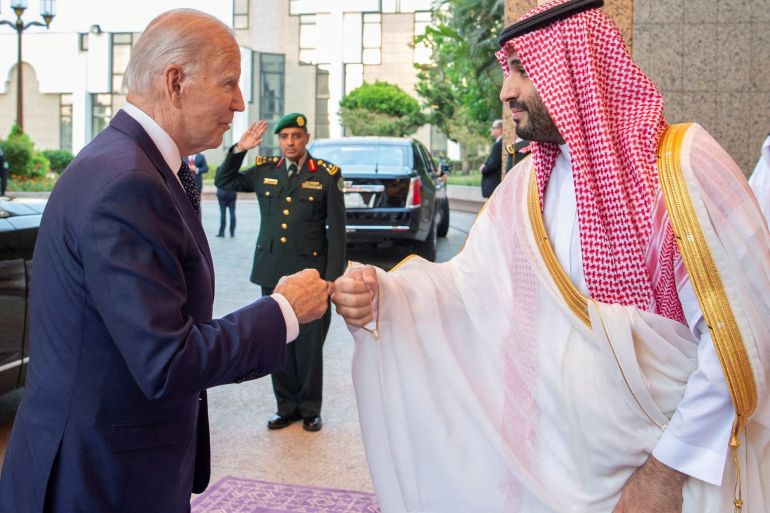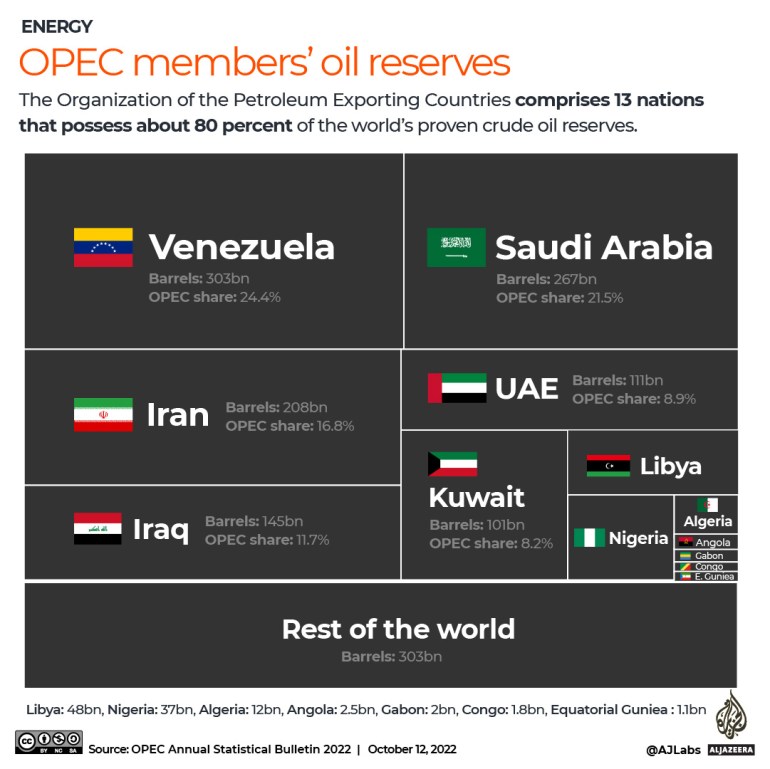Biden vows ‘consequences’ for Saudi Arabia after oil output cuts
US president suggests he will soon take action as aides announce the White House is re-evaluating its relationship with the kingdom.

Joe Biden, the United States president, has warned Saudi Arabia that there will be “consequences” after a global cartel of oil-producing countries led by the kingdom and Russia announced that they would cut oil production despite Washington’s objections.
His remarks on Tuesday come a day after influential Democratic Senator Bob Menendez, the chairman of the Senate Foreign Relations Committee, said the US must immediately freeze all cooperation with Saudi Arabia, including arms sales.
Keep reading
list of 3 itemsUS senator seeks ‘freeze’ in cooperation with Saudi Arabia
US Democrats rally against Saudi Arabia, UAE after oil cuts
“There’s going to be some consequences for what they’ve done with Russia,” Biden said in an interview with CNN.
“I’m not going to get into what I’d consider and what I have in mind. But there will be, there will be consequences.”

Last week, the OPEC+ group said it would slash oil production targets by two million barrels a day, defying pressure from the US.
Saudi Arabia, the world’s top oil exporter, said the decision aimed to stabilise the oil market – not drive up prices – amid interest rate hikes by central banks and the prospects of a global recession.
But critics argued the production curbs raise oil prices globally, which generates more revenue for Russia to continue to fund its war in Ukraine, despite Western sanctions on its economy. The move was also seen as a diplomatic slap in the face for the Biden administration as it prepares for November’s critical midterm elections next month.
“This is really seen to benefit the president’s political adversaries in the US,” said Al Jazeera’s Kimberly Halkett, reporting from Washington. “High energy prices are not good for the president politically,” she added. “The other reason the White House is not happy about this is the fact that this is really seen as aligning with Russia.”
But Saudi foreign minister Prince Faisal bin Farhan on Tuesday defended the move, saying it “was purely economic and was taken unanimously by the [organisation’s] member states”.
“OPEC+ members acted responsibly and took the appropriate decision,” he told Al-Arabiya television station.
Marwan Kalaban, of the Arab Centre for Research and Policy Studies, told Al Jazeera he does not believe the Saudis wanted to “align with Russia”.
“Russia is in a pretty weak position right now and cannot actually compensate for the US alliance with Saudi Arabia. The Saudis still need the Americans very much as a strong security ally in the middle of so many challenges,” he said.
He said the decision by Riyadh was taken completely based on “economic grounds”.
“Oil prices have been plummeting over the past few months and the Saudis need the money. They need to keep the price as high as possible. They have so many schemes and projects in the kingdom … so they need all sorts of cash in order to keep that going.”
Russian President Vladimir Putin on Tuesday also defended the planned cuts, saying “our decisions … aren’t directed against anyone”.
“Our actions are aimed at ensuring stability in global energy markets to make both consumers of energy resources and those who deal with production and supplies feel calm, stability and confidence, to help balance supply and demand,” Putin added, as he hosted United Arab Emirates (UAE) President Sheikh Mohammed bin Zayed Al Nahyan in Saint Petersburg.
While Saudi Arabia stressed that all 23 OPEC+ members backed the cut, the Financial Times reported on Monday that the UAE and Iraq had expressed misgivings, according to several people briefed on the talks. Citing the same sources, the British newspaper said that a suggestion by the UAE for a delay did not also gain traction. Following the cartel’s meeting in Vienna, UAE Minister of Energy Suhail al-Mazrouei said the decision was “technical, not political”.
Biden in July travelled to Saudi Arabia and met Crown Prince Mohammed bin Salman, despite promising to make the kingdom an international “pariah” following the 2018 murder of journalist Jamal Khashoggi.
US intelligence says the crown prince approved an operation to capture or kill Khashoggi, a Saudi insider-turned-critic, who was murdered and dismembered by Saudi agents inside the kingdom’s consulate in Istanbul. The prince has denied ordering the killing but acknowledged it took place “under my watch”. Biden said in July he told the prince he thought he was responsible.
Future course
Commenting on his trip to Saudi Arabia, Biden told CNN he “didn’t go there about oil”.
“I went there to make sure that we were not going to walk away from the Middle East,” he said.
Separately on Tuesday, US Department of State spokesman Ned Price said the Biden administration was “reviewing” its relationship with Saudi Arabia in consultation with lawmakers in Washington and allies abroad.
John Kirby, the White House national security spokesman, said Biden would work with Congress “to think through what that relationship ought to look like going forward”.
“And I think he’s going to be willing to start to have those conversations right away. I don’t think this is anything that’s going to have to wait or should wait, quite frankly, for much longer,” Kirby added.
The Saudi embassy in Washington said in a statement on Tuesday the relationship is “strategic” and has “advanced the security and stability of the Middle East”.
Some of Saudi Arabia’s supporters also have argued that the security relationship between Washington and Riyadh is mutually beneficial — not a favour from the US.
Price also said the Biden administration would not overlook Iran, a US adversary and a bitter regional rival of Saudi Arabia, in the review.
Much of US arms sales to Saudi Arabia have been made with Iran’s threat in the region in mind.
“There are security challenges, some of which emanate from Iran. Certainly, we won’t take our eye off the threat that Iran poses not only to the region, but in some ways beyond,” Price said.